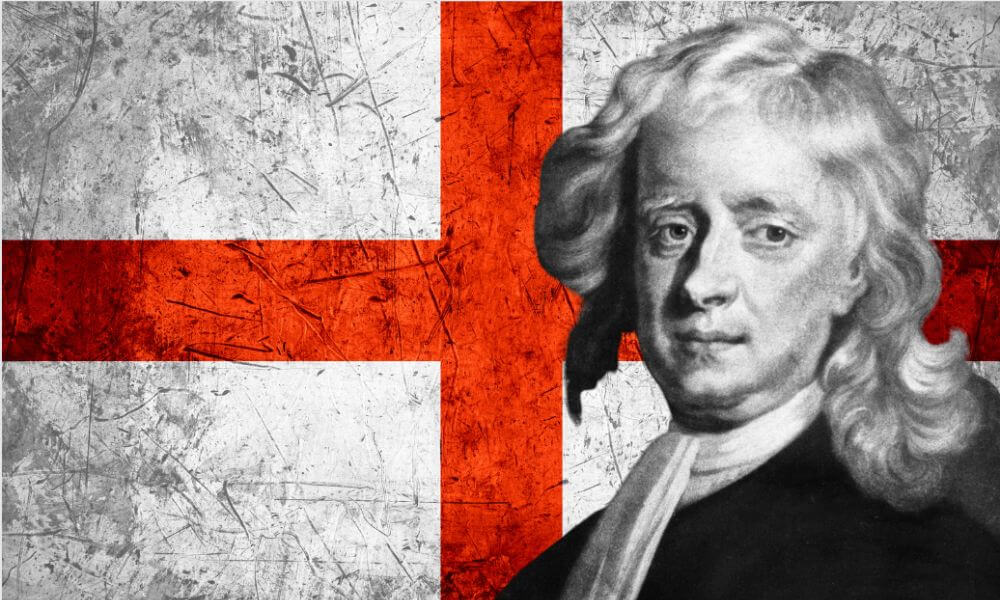Isaac Newton’s native language was English. He was born in England in 1642, and while the English of his day would have been markedly different from the English we speak today, they are both the same language by all definitions. Being an immensely learned man, he also wrote in Latin and Greek.
Isaac Newton remains one of the single most influential figures in the history of maths and physics.
He was one of the main spearheads of the Scientific Revolution and the Enlightenment in the West, and his work remains among the most important pieces of science in history.
During his life, English was his native language.
Let’s find out more.

What was Isaac Newton’s native language?
Isaac Newton’s native language was English. This is the language he was born and raised with, the language he would have used on a day-to-day basis and to converse with people he knew.
Newton was born in England, in Lincolnshire, in 1643.
It is certainly a very interesting question to consider what English would have looked like at this time.
Depending on how you define it, English was effectively developing into its modern form during Newton’s lifetime.
From about the beginning of the Tudor period up to the Restoration, the language spoken is known today as Early Modern English.
This is a form of English that is highly recognizable to modern English speakers, and most could quite easily read it without much help.
However, still, it is not quite the same as Modern English.
Most scholars place the final development of Modern English as being in the mid-to-late 17th Century.
Given Newton was born in 1643, he was essentially alive for the transition from Early Modern to Modern.
Of course, in reality, the lines are never as clearly defined as this.
Newton’s English would appear as Modern English to readers today, and yet at the same time there would be many aspects of spelling and grammar that would appear unfamiliar.
Indeed, until the publication of Samuel Johnson’s dictionary in 1755, English spelling was simply not standardized at all.
So, over the course of Newton’s lifetime, English was undergoing a great deal of standardization and change.
All of this is to say that Isaac Newton spoke English by any definition, and yet at the same time it is separated from Modern English by just enough time that modern readers might have minor difficulty with it.
In any case, his native language was English.
What language did Isaac Newton write in?
Isaac Newton habitually wrote in Latin.
All of his mathematical, philosophical, astronomical and other academic works were written in Latin.
For centuries, Latin had been the language of scholarship and academia in Europe.
This had been true to some extent more or less since the time of the collapse of the Roman Empire.
Even for another century after Newton’s death, Latin would continue to be the main language of study and academia.
All of his academic work, then, was written in Latin, and he would naturally have read a lot of Latin texts himself, too.
He was also able to read and write in Greek, as though this was not the universal language of science, Greek texts were nonetheless of equal importance to Renaissance scholarship.
Importantly, though, he did not exclusively write in Latin; all of his academic work was in Latin, but he wrote a large body of correspondence, most of which was in English.
Again, this English would naturally seem very archaic to English ears, akin to Shakespeare; but it was English in every sense of the word and modern readers will be able to understand it with no trouble.
Did Newton speak English or Latin?
Newton spoke English.
Though Latin was used in academic institutions across Europe, it was only really spoken in an ecclesiastical setting.
It was the language of the church and it would be used in religious ceremonies, as well as in the Vatican City, but it was never used as a spoken language in the academic fields.
Indeed, just because someone is confident in writing Latin does not mean they would be comfortable in speaking it.
So, Newton spoke English in his day-to-day life, and would not have used Latin as a vernacular except in certain very specific scenarios.
Was Isaac Newton from the U.K.?
The UK as we know it today really did not exist in Newton’s lifetime.
He was from England, which of course became part of the United Kingdom of Great Britain and Ireland, but this did not happen until long after Newton’s death.
Indeed, the foundation of the modern United Kingdom does not occur until 1922.
The earliest date for the formation of the U.K. is around 1801.
This is an important distinction, then.
Newton was English and his birth long predated the existence of the United Kingdom, though many tend to think of the United Kingdom as having existed since the medieval period.
So, again, Newton wrote most of his works in Latin because this was the international language of science in his day and for a long time after.
But his own, native tongue was English; this is what he grew up speaking, and what he would have used on a day-to-day basis.
Virtually everything he wrote in terms of his scientific body of work, though, was in Latin simply because this is how such texts were written at the time.

